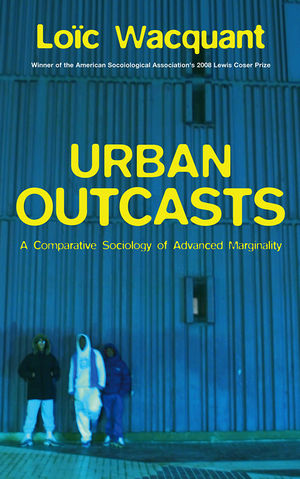Urban Outcasts: A Comparative Sociology of Advanced MarginalityISBN: 978-0-7456-3125-7
Paperback
360 pages
November 2007, Polity
 This is a Print-on-Demand title. It will be printed specifically to fill your order. Please allow an additional 10-15 days delivery time. The book is not returnable.
Other Available Formats: Hardcover
|
||||||
Area
"This book should be mandatory reading for scholars, graduate students and advanced undergraduates interested in this subject ... this is an exciting book written by one of the most prominent urban sociologists today. It provides a useful concept for understanding urban poverty (i.e. advanced marginality), outlines a powerful argument for how advanced marginality varies in different countries and, most importantly, identifies the power of states to shape the structure of these places and the life-chances of their residents."
Urban Studies
"Leading Chicago sociology Loic Wacquant's comparative analysis of advanced marginality in the American ghetto and French banlieue is the best of a spate of works on urban poverty to be released recently."
Sociology
"A thoroughly researched manifesto for an urban sociology that empowers the new precarious labour force of the post-industrial city."
Race and Class
"[Wacquant] raises a series of valuable discussion points on methodology, scales of explanation, the value and challenges of comparative study, modes of writing, and the question of the author's positionality and its effects on the drama he is recounting - a rich harvest to garner from a single volume ... would make first-rate reading and discussion material for senior undergraduate and graduate seminars."
Annals of the Association of American Geographers
Ivan Szelenyi, author of Cities After Socialism and Patterns of Exclusion
"In this impressive book, Wacquant deploys his unparalleled knowledge of the black American ghetto and the French banlieue to tackle a series of foundational questions about inequality and poverty. He shows us the variable ways in which these two conditions get constituted in two strands of capitalism and how 'territorial stigmatization' affects both the strategies of the poor and the public policies aimed at their reserved zones. The result is a provocative analysis of polarization from below and of the lived realities of urban marginality."
Saskia Sassen, author of The Global City and Territory, Authority, Rights



